一般将来时用法及练习题
一般将来时练习题及答案
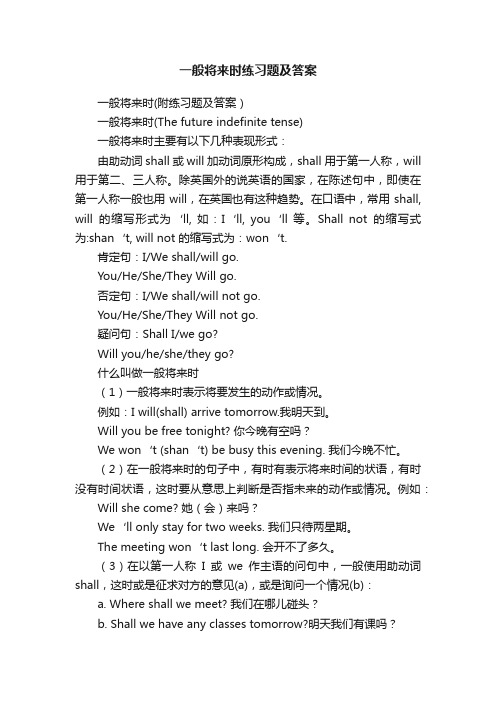
一般将来时练习题及答案一般将来时(附练习题及答案)一般将来时(The future indefinite tense)一般将来时主要有以下几种表现形式:由助动词shall或will加动词原形构成,shall 用于第一人称,will 用于第二、三人称。
除英国外的说英语的国家,在陈述句中,即使在第一人称一般也用will,在英国也有这种趋势。
在口语中,常用shall, will的缩写形式为‘ll, 如:I‘ll, you‘ll 等。
Shall not的缩写式为:shan‘t, will not 的缩写式为:won‘t.肯定句:I/We shall/will go.You/He/She/They Will go.否定句:I/We shall/will not go.You/He/She/They Will not go.疑问句:Shall I/we go?Will you/he/she/they go?什么叫做一般将来时(1)一般将来时表示将要发生的动作或情况。
例如:I will(shall) arrive tomorrow.我明天到。
Will you be free tonight? 你今晚有空吗?We won‘t (shan‘t) be busy this evening. 我们今晚不忙。
(2)在一般将来时的句子中,有时有表示将来时间的状语,有时没有时间状语,这时要从意思上判断是否指未来的动作或情况。
例如:Will she come? 她(会)来吗?We‘ll only stay for two weeks. 我们只待两星期。
The meeting won‘t last long. 会开不了多久。
(3)在以第一人称I或we作主语的问句中,一般使用助动词shall,这时或是征求对方的意见(a),或是询问一个情况(b):a. Where shall we meet? 我们在哪儿碰头?b. Shall we have any classes tomorrow?明天我们有课吗?在这类问句中,近年来也有不少人用will,特别是在美国。
一般将来时练习题及答案
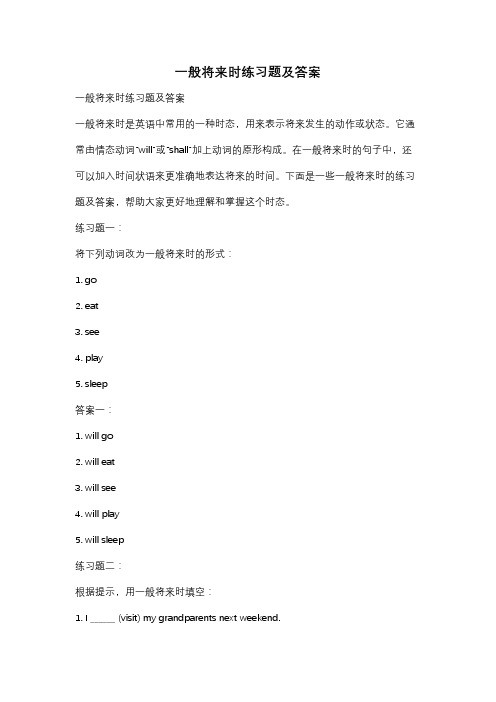
一般将来时练习题及答案一般将来时练习题及答案一般将来时是英语中常用的一种时态,用来表示将来发生的动作或状态。
它通常由情态动词“will”或“shall”加上动词的原形构成。
在一般将来时的句子中,还可以加入时间状语来更准确地表达将来的时间。
下面是一些一般将来时的练习题及答案,帮助大家更好地理解和掌握这个时态。
练习题一:将下列动词改为一般将来时的形式:1. go2. eat3. see4. play5. sleep答案一:1. will go2. will eat3. will see4. will play5. will sleep练习题二:根据提示,用一般将来时填空:1. I ______ (visit) my grandparents next weekend.2. They ______ (have) a party next month.3. She ______ (buy) a new car next year.4. We ______ (travel) to Europe next summer.5. He ______ (start) his new job next week.答案二:1. will visit2. will have3. will buy4. will travel5. will start练习题三:选择正确的一般将来时形式填空:1. I ______ (will / am going to) study for the exam tomorrow.2. They ______ (will / are going to) visit their friends in the evening.3. She ______ (will / is going to) cook dinner for her family tonight.4. We ______ (will / are going to) go shopping this weekend.5. He ______ (will / is going to) meet his friends at the park later. 答案三:1. will2. are going to3. is going to4. are going to5. is going to练习题四:根据句意,用一般将来时填空:1. The train ______ (arrive) at 10 o'clock tomorrow morning.2. We ______ (have) a picnic if the weather is nice.3. She ______ (not go) to the party because she has other plans.4. They ______ (not watch) the movie because they have already seen it.5. He ______ (not come) to the meeting because he is busy.答案四:1. will arrive2. will have3. will not go4. will not watch5. will not come练习题五:将下列句子改为否定句和疑问句形式:1. I will finish my homework.2. They will go to the beach.3. She will buy a new dress.4. We will have dinner at the restaurant.5. He will meet his friends at the cinema.答案五:1. I will not finish my homework. / Will I not finish my homework?2. They will not go to the beach. / Will they not go to the beach?3. She will not buy a new dress. / Will she not buy a new dress?4. We will not have dinner at the restaurant. / Will we not have dinner at the restaurant?5. He will not meet his friends at the cinema. / Will he not meet his friends at the cinema?通过以上的练习题及答案,希望大家对一般将来时有了更深入的了解。
英语一般将来时专题练习(及答案)含解析
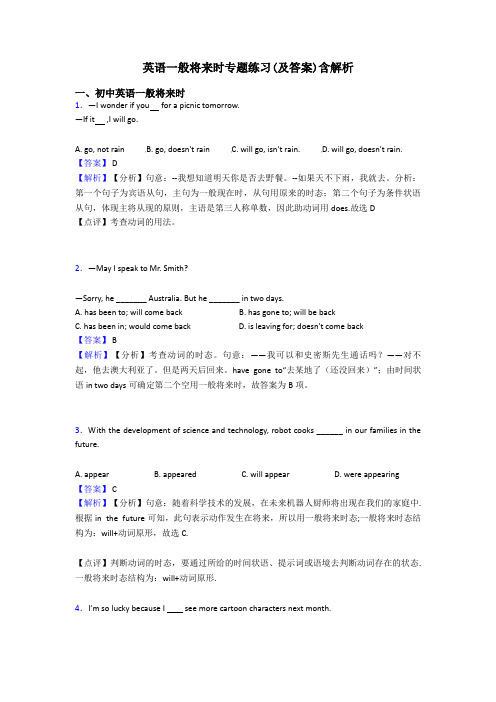
英语一般将来时专题练习(及答案)含解析一、初中英语一般将来时1.—I wonder if you for a picnic tomorrow.—If it ,I will go.A. go, not rainB. go, doesn't rainC. will go, isn't rain.D. will go, doesn't rain.【答案】 D【解析】【分析】句意:--我想知道明天你是否去野餐。
--如果天不下雨,我就去。
分析:第一个句子为宾语从句,主句为一般现在时,从句用原来的时态;第二个句子为条件状语从句,体现主将从现的原则,主语是第三人称单数,因此助动词用does.故选D【点评】考查动词的用法。
2.—May I speak to Mr. Smith?—Sorry, he _______ Australia. But he _______ in two days.A. has been to; will come backB. has gone to; will be backC. has been in; would come backD. is leaving for; doesn't come back【答案】 B【解析】【分析】考查动词的时态。
句意:——我可以和史密斯先生通话吗?——对不起,他去澳大利亚了。
但是两天后回来。
have gone to“去某地了(还没回来)”;由时间状语in two days可确定第二个空用一般将来时,故答案为B项。
3.With the development of science and technology, robot cooks ______ in our families in the future.A. appearB. appearedC. will appearD. were appearing【答案】 C【解析】【分析】句意:随着科学技术的发展,在未来机器人厨师将出现在我们的家庭中. 根据in the future可知,此句表示动作发生在将来,所以用一般将来时态;一般将来时态结构为:will+动词原形,故选C.【点评】判断动词的时态,要通过所给的时间状语、提示词或语境去判断动词存在的状态. 一般将来时态结构为:will+动词原形.4.I’m so lucky because I see more cartoon characters next month.A. is able toB. will be able toC. be able toD. was able to【答案】B【解析】【分析】句意:我真幸运因为我下个月能看到更多的卡通人物。
一般将来时讲解及练习(含答案)
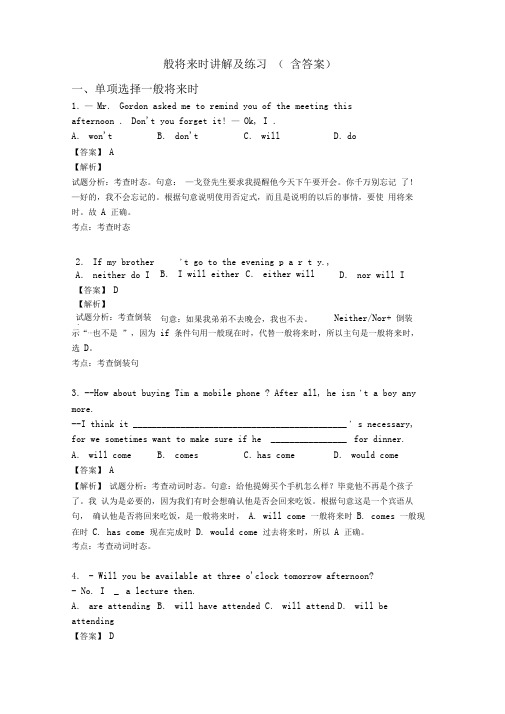
般将来时讲解及练习(含答案)一、单项选择一般将来时1.—Mr.Gordon asked me to remind you of the meeting thisafternoon .Don't you forget it! —Ok, I .A.won't B.don't C.will D.do【答案】A【解析】试题分析:考查时态。
句意:—戈登先生要求我提醒他今天下午要开会。
你千万别忘记了!—好的,我不会忘记的。
根据句意说明使用否定式,而且是说明的以后的事情,要使用将来时。
故A 正确。
考点:考查时态2.If my brother doesn 't go to the evening p a r t y.,A.neither do I B.I will either C.either willI D.nor will I【答案】D 【解析】试题分析:考查倒装句:句意:如果我弟弟不去晚会,我也不去。
Neither/Nor+ 倒装句,表示“⋯也不是”,因为if 条件句用一般现在时,代替一般将来时,所以主句是一般将来时,选D。
考点:考查倒装句3.--How about buying Tim a mobile phone ? After all, he isn 't a boy any more.--I think it _____________________________________________ ' s necessary, for we sometimes want to make sure if he ________________ for dinner. A.will come B.comes C.has come D.would come【答案】A【解析】试题分析:考查动词时态。
句意:给他提姆买个手机怎么样?毕竟他不再是个孩子了。
我认为是必要的,因为我们有时会想确认他是否会回来吃饭。
(完整word版)一般将来时练习题及答案学习
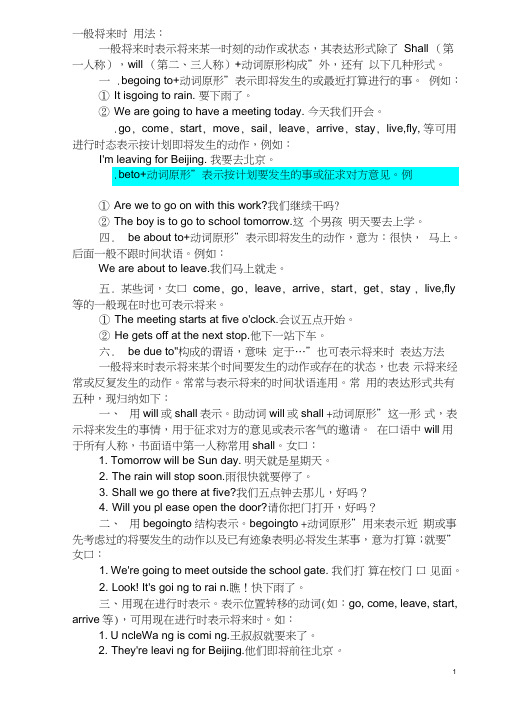
一般将来时用法:一般将来时表示将来某一时刻的动作或状态,其表达形式除了Shall (第一人称),will (第二、三人称)+动词原形构成”外,还有以下几种形式。
一 .begoing to+动词原形”表示即将发生的或最近打算进行的事。
例如:①It isgoing to rain. 要下雨了。
②We are going to have a meeting today. 今天我们开会。
.go, come, start, move, sail, leave, arrive, stay, live,fly, 等可用进行时态表示按计划即将发生的动作,例如:①Are we to go on with this work?我们继续干吗?②The boy is to go to school tomorrow.这个男孩明天要去上学。
四.be about to+动词原形”表示即将发生的动作,意为:很快,马上。
后面一般不跟时间状语。
例如:We are about to leave.我们马上就走。
五.某些词,女口come, go, leave, arrive, start, get, stay , live,fly 等的一般现在时也可表示将来。
①The meeting starts at five o'clock.会议五点开始。
②He gets off at the next stop.他下一站下车。
六.be due to"构成的谓语,意味定于…”也可表示将来时表达方法一般将来时表示将来某个时间要发生的动作或存在的状态,也表示将来经常或反复发生的动作。
常常与表示将来的时间状语连用。
常用的表达形式共有五种,现归纳如下:一、用will或shall表示。
助动词will或shall +动词原形”这一形式,表示将来发生的事情,用于征求对方的意见或表示客气的邀请。
在口语中will用于所有人称,书面语中第一人称常用shall。
一般将来时练习题及答案
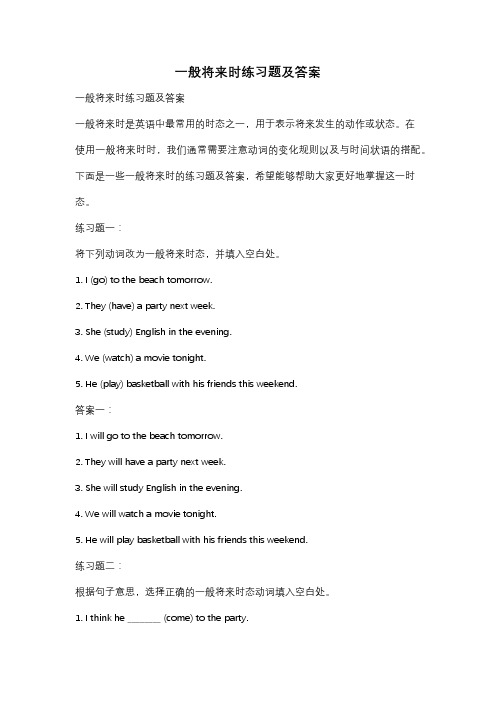
一般将来时练习题及答案一般将来时练习题及答案一般将来时是英语中最常用的时态之一,用于表示将来发生的动作或状态。
在使用一般将来时时,我们通常需要注意动词的变化规则以及与时间状语的搭配。
下面是一些一般将来时的练习题及答案,希望能够帮助大家更好地掌握这一时态。
练习题一:将下列动词改为一般将来时态,并填入空白处。
1. I (go) to the beach tomorrow.2. They (have) a party next week.3. She (study) English in the evening.4. We (watch) a movie tonight.5. He (play) basketball with his friends this weekend.答案一:1. I will go to the beach tomorrow.2. They will have a party next week.3. She will study English in the evening.4. We will watch a movie tonight.5. He will play basketball with his friends this weekend.练习题二:根据句子意思,选择正确的一般将来时态动词填入空白处。
1. I think he ________ (come) to the party.2. They ________ (not be) late for the meeting.3. We ________ (visit) our grandparents next month.4. She ________ (not go) to the concert with us.5. ________ you ________ (help) me with my homework?答案二:1. I think he will come to the party.2. They will not be late for the meeting.3. We will visit our grandparents next month.4. She will not go to the concert with us.5. Will you help me with my homework?练习题三:根据句子意思,用一般将来时态的动词填空。
【英语】英语一般将来时常见题型及答题技巧及练习题(含答案)
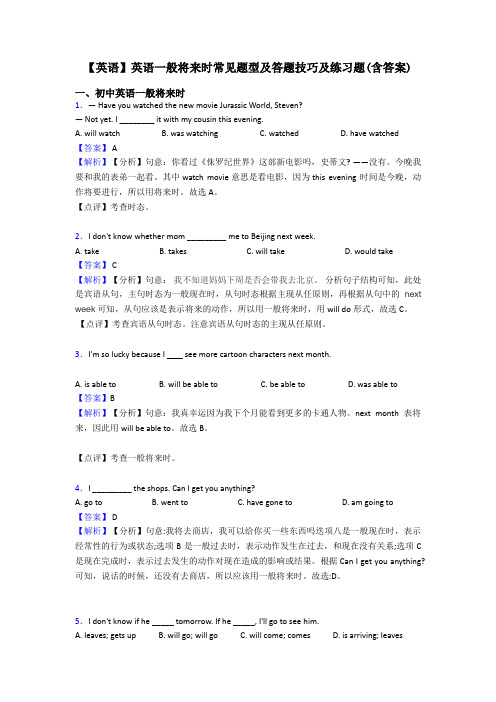
【英语】英语一般将来时常见题型及答题技巧及练习题(含答案)一、初中英语一般将来时1.— Have you watched the new movie Jurassic World, Steven?— Not yet. I ________ it with my cousin this evening.A. will watchB. was watchingC. watchedD. have watched【答案】 A【解析】【分析】句意:你看过《侏罗纪世界》这部新电影吗,史蒂文? ——没有。
今晚我要和我的表弟一起看。
其中watch movie意思是看电影,因为this evening 时间是今晚,动作将要进行,所以用将来时。
故选A。
【点评】考查时态。
2.I don't know whether mom _________ me to Beijing next week.A. takeB. takesC. will takeD. would take【答案】 C【解析】【分析】句意:我不知道妈妈下周是否会带我去北京。
分析句子结构可知,此处是宾语从句,主句时态为一般现在时,从句时态根据主现从任原则,再根据从句中的next week可知,从句应该是表示将来的动作,所以用一般将来时,用will do形式,故选C。
【点评】考查宾语从句时态。
注意宾语从句时态的主现从任原则。
3.I’m so lucky because I see more cartoon characters next month.A. is able toB. will be able toC. be able toD. was able to【答案】B【解析】【分析】句意:我真幸运因为我下个月能看到更多的卡通人物。
next month表将来,因此用will be able to。
故选B。
【点评】考查一般将来时。
4.I _________ the shops. Can I get you anything?A. go toB. went toC. have gone toD. am going to【答案】 D【解析】【分析】句意:我将去商店,我可以给你买一些东西吗迭项八是一般现在时,表示经常性的行为或状态;选项B是一般过去时,表示动作发生在过去,和现在没有关系;选项C 是现在完成时,表示过去发生的动作对现在造成的影响或结果。
一般将来时练习题及答案
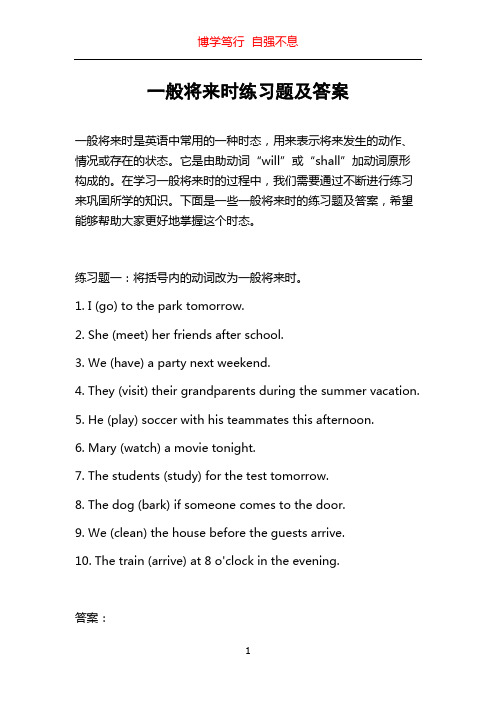
一般将来时练习题及答案一般将来时是英语中常用的一种时态,用来表示将来发生的动作、情况或存在的状态。
它是由助动词“will”或“shall”加动词原形构成的。
在学习一般将来时的过程中,我们需要通过不断进行练习来巩固所学的知识。
下面是一些一般将来时的练习题及答案,希望能够帮助大家更好地掌握这个时态。
练习题一:将括号内的动词改为一般将来时。
1. I (go) to the park tomorrow.2. She (meet) her friends after school.3. We (have) a party next weekend.4. They (visit) their grandparents during the summer vacation.5. He (play) soccer with his teammates this afternoon.6. Mary (watch) a movie tonight.7. The students (study) for the test tomorrow.8. The dog (bark) if someone comes to the door.9. We (clean) the house before the guests arrive.10. The train (arrive) at 8 o'clock in the evening.答案:1. will go2. will meet3. will have4. will visit5. will play6. will watch7. will study8. will bark9. will clean10. will arrive练习题二:根据提示完成下列对话,使用一般将来时。
A: Hi, Lisa! What (you/do) this weekend?B: I (visit) my grandparents. They live in the countryside. A: That sounds nice. How long (you/stay) there?B: I (stay) for two days. I'll come back on Sunday evening. A: Have a great time!答案:A: Hi, Lisa! What will you do this weekend?B: I will visit my grandparents. They live in the countryside. A: That sounds nice. How long will you stay there?B: I will stay for two days. I'll come back on Sunday evening. A: Have a great time!练习题三:选择正确的动词形式填空。
【英语】英语一般将来时答题技巧及练习题(含答案)含解析
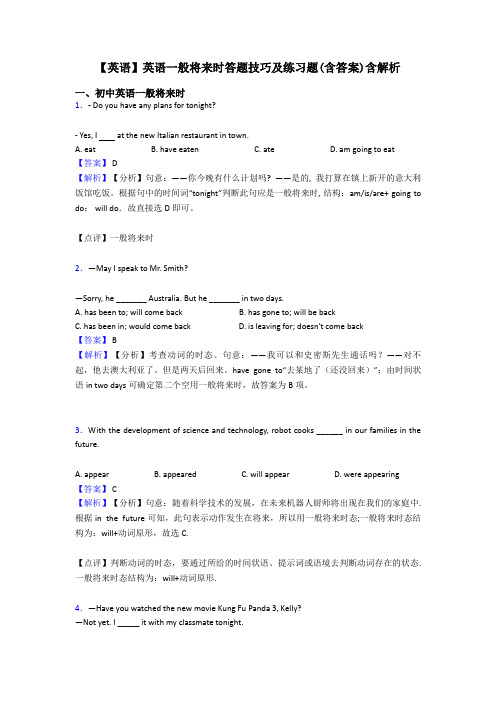
【英语】英语一般将来时答题技巧及练习题(含答案)含解析一、初中英语一般将来时1.- Do you have any plans for tonight?- Yes, I at the new Italian restaurant in town.A. eatB. have eatenC. ateD. am going to eat【答案】 D【解析】【分析】句意:——你今晚有什么计划吗? ——是的, 我打算在镇上新开的意大利饭馆吃饭。
根据句中的时间词“tonight”判断此句应是一般将来时, 结构:am/is/are+ going to do; will do.故直接选D即可。
【点评】一般将来时2.—May I speak to Mr. Smith?—Sorry, he _______ Australia. But he _______ in two days.A. has been to; will come backB. has gone to; will be backC. has been in; would come backD. is leaving for; doesn't come back【答案】 B【解析】【分析】考查动词的时态。
句意:——我可以和史密斯先生通话吗?——对不起,他去澳大利亚了。
但是两天后回来。
have gone to“去某地了(还没回来)”;由时间状语in two days可确定第二个空用一般将来时,故答案为B项。
3.With the development of science and technology, robot cooks ______ in our families in the future.A. appearB. appearedC. will appearD. were appearing【答案】 C【解析】【分析】句意:随着科学技术的发展,在未来机器人厨师将出现在我们的家庭中. 根据in the future可知,此句表示动作发生在将来,所以用一般将来时态;一般将来时态结构为:will+动词原形,故选C.【点评】判断动词的时态,要通过所给的时间状语、提示词或语境去判断动词存在的状态. 一般将来时态结构为:will+动词原形.4.—Have you watched the new movie Kung Fu Panda 3, Kelly?—Not yet. I _____ it with my classmate tonight.A. will watchB. was watchingC. have watched【答案】A【解析】【分析】句意:—凯莉,你看过新电影《功夫熊猫3》吗?—还没有呢。
一般将来时讲解(附习题+答案)

一般将来时讲解(附习题+答案)一、一般将来时的含义:表示动作发生在将来二、一般将来时的句型:(1) will/shall+动词原形(2) be going to+动词原形三、一般将来时的时间状语:tomorrow(明天)、the day after tomorrow(后天)、next...(下一...): next week(下一周)、next year(明年)、next month(下个月)in+一段时间(...之后): in three days(三天之后)、in the future在未来this evening(今天晚上)四、一般将来时的句型结构:(1) will/shall+动词原形(will not =won’t)(will 各种人称均可用,shall 只能用于第一人称)1)肯定句:主语+will/shall+动词原型...如:I will go to school tomorrow.我明天将会去学校He will go to school tomorrow.他明天将会去学校。
2)否定句:主语+will/shall+not+动词原型...如:I won’t go to school tomorrow.我明天将不会去学校。
He won’t go to school tomorrow.他明天将不会去学校。
3)一般疑问句:Will/Shall +主语+动词原型...如:Will you go to school tomorrow?你明天要去学校吗?Will he go to school tomorrow?他明天要去学校吗?肯定回答:Yes, 主语+will.如:Yes, I will.Yes, he will.否定回答:No,主语+will+not.如:No, I won’t.No, he won’t.4) 特殊疑问句:特殊疑问词+will/shall+主语+动词原型...如:What will you do tomorrow?你明天将会做什么?What will he do tomorrow?他明天将会做什么?(2) be going to+动词原形1)肯定句:主语+be going to +动词原型...如:I am going to buy some books tomorrow.我明天打算去买一些书。
一般将来时用法及专项练习

一般将来时用法及专项练习一般将来时是用来表示将来某个时间会发生的动作或存在的状态,也可以表示将来经常或反复发生的动作。
它由助动词shall或will加上动词原形构成,其中shall用于第一人称,will 用于第二、三人称,但现在第一人称也常用will,两者的区别并不明显。
另外,也可以用“be going to + 动词原形”来表示。
通常与表示时间的词语连用,如tomorrow。
next…。
in(the)future,soon。
in five days,in two weeks等。
例如,如果明天下雨,我就不会来:“I shall not come if it rains tomorrow.” 我的爸爸下星期要到中国去:“My father will leave for China next week.”以下是一般将来时的句型:1.肯定句:主语+shall /will+动词+其他成份例如:“The workers will build a new school here next year.” 工人们明年将在这儿盖一所新学校。
“They will go shopp ing this afternoon.” 今天下午他们将要去购物。
“XXX” 今晚我们将美餐一顿。
“We shall be there before dark.” 我们天黑前会到达那里。
2.否定句:主语+shall /will+not+动词+其他成份例如:“XXX’t come back this week.” 这一周她不回来了。
“I will not go shopping one hour later.” 一小时之后我不会去购物。
“He won’t play football with you before he finishes his work.” 他干完活后才能跟你踢足球。
3.疑问句:shall /will+主语+动词+其他成份。
【英语】一般将来时知识点梳理及经典练习(超详细)经典

【英语】一般将来时知识点梳理及经典练习(超详细)经典一、一般将来时1.- Do you have any plans for tonight?- Yes, I at the new Italian restaurant in town.A. eatB. have eatenC. ateD. am going to eat【答案】 D【解析】【分析】句意:——你今晚有什么计划吗? ——是的, 我打算在镇上新开的意大利饭馆吃饭。
根据句中的时间词“tonight”判断此句应是一般将来时, 结构:am/is/are+ going to do; will do.故直接选D即可。
【点评】一般将来时2.If it is clear tomorrow , I ________a bike to the underground station.A. rideB. will rideC. rodeD. have ridden【答案】 B【解析】【分析】句意:如果明天天气好的话,我会骑自行车去地铁站。
ride骑车,动词原形;will ride是一般将来时态;rode是ride的过去式形式;have ridden是现在完成时态。
句中if引导的是条件状语从句,从句中一般现在时态,主句应使用一般将来时态,故应选B。
【点评】考查动词的时态,以及if引导的是条件状语从句,从句中一般现在时态,主句应使用一般将来时态。
3.— I hear your father has gone to Tokyo on business?— Yes. And he _______ in three weeks.A. has returnedB. will returnC. would returnD. returns【答案】 B【解析】【分析】句意:—我听说你父亲出差去日本了?—是的。
他将在三周后回来。
时间状语in three weeks与一般将来时连用,故选B。
英语一般将来时技巧(很有用)及练习题

英语一般将来时技巧(很有用)及练习题一、初中英语一般将来时1.I wonder when they ________ for Beijing. I will go to the train station to see them off when they ________.A. will leave; leaveB. leave; will leaveC. go; leaveD. will go; leave【答案】 A【解析】【分析】句意:我想知道他们什么时候去北京。
当他们离开的时候,我将去车站送他们。
leave for,动身前往,去……。
第一句话是宾语从句,因此从句可以使用一般将来时,第二句是when引导的时间状语从句,应遵循主将从现的原则,因此应使用一般现在时,故答案是A。
【点评】考查动词辨析和时间状语从句中的主将从现原则。
注意识记固定搭配leave for,同时只要记住在时间状语从句中的主将从现原则。
2.—May I speak to Mr. Smith?—Sorry, he _______ Australia. But he _______ in two days.A. has been to; will come backB. has gone to; will be backC. has been in; would come backD. is leaving for; doesn't come back【答案】 B【解析】【分析】考查动词的时态。
句意:——我可以和史密斯先生通话吗?——对不起,他去澳大利亚了。
但是两天后回来。
have gone to“去某地了(还没回来)”;由时间状语in two days可确定第二个空用一般将来时,故答案为B项。
3.With the development of science and technology, robot cooks ______ in our families in the future.A. appearB. appearedC. will appearD. were appearing【答案】 C【解析】【分析】句意:随着科学技术的发展,在未来机器人厨师将出现在我们的家庭中. 根据in the future可知,此句表示动作发生在将来,所以用一般将来时态;一般将来时态结构为:will+动词原形,故选C.【点评】判断动词的时态,要通过所给的时间状语、提示词或语境去判断动词存在的状态. 一般将来时态结构为:will+动词原形.4.—Do you know when Mrs. White for dinner this evening?—No, but I think she when she is free.A. will come; will comeB. will come; comesC. comes; will come【答案】 A【解析】【分析】句意:——你知道怀特太太今晚是否来吃晚饭吗?——不知道。
一般将来时讲解+练习题
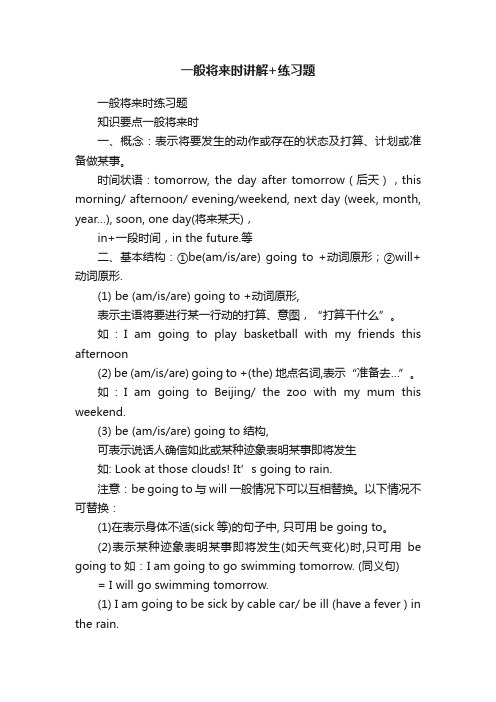
一般将来时讲解+练习题一般将来时练习题知识要点一般将来时一、概念:表示将要发生的动作或存在的状态及打算、计划或准备做某事。
时间状语:tomorrow, the day after tomorrow(后天),this morning/ afternoon/ evening/weekend, next day (week, month, year…), soon, one day(将来某天),in+一段时间,in the future.等二、基本结构:①be(am/is/are) going to +动词原形;②will+ 动词原形.(1) be (am/is/are) going to +动词原形,表示主语将要进行某一行动的打算、意图,“打算干什么”。
如:I am going to play basketball with my friends this afternoon(2) be (am/is/are) going to +(the) 地点名词,表示“准备去…”。
如:I am going to Beijing/ the zoo with my mum this weekend.(3) be (am/is/are) going to 结构,可表示说话人确信如此或某种迹象表明某事即将发生如: Look at those clouds! It’s going to rain.注意:be going to 与will一般情况下可以互相替换。
以下情况不可替换:(1)在表示身体不适(sick等)的句子中, 只可用be going to。
(2)表示某种迹象表明某事即将发生(如天气变化)时,只可用be going to 如:I am going to go swimming tomorrow. (同义句) = I will go swimming tomorrow.(1) I am going to be sick by cable car/ be ill (have a fever ) in the rain.(2) Look at those clouds! It’s going to rain.三、一般将来时的句型变化:1.肯定句:主语+ be(am/is/are) going to +动词原形或主语+ will + 动词原形. +动词原形否定句: (1)在be动词(am, is, are)后加not (2)情态动词will后加not成won’t. Eg:I’m going to have a picnic this afternoon.→ I’m not going to…..I will have a picnic this afternoon. → I will not (won’t) …2.2.一般疑问句:一调二改三问号(1)be或will调到句首(2)第一二人称互换:I/we – you;and改为or(否定与疑问句);some改为any;例如:We are going to buy some food and fruit this weekend. 或We will buy some…Are you going to buy any food or fruit this weekend? 或Will you buy any…? 3.特殊疑问句:who, what, where, when, how等特殊疑问词。
初中一般将来时练习题及答案

初中一般将来时练习题及答案一、动词的一般将来时形式:情态动词will/shall + 动词原形1. I (watch) a movie tonight.2. They (visit) their grandparents tomorrow.3. She (do) her homework after dinner.4. We (go) hiking this weekend.5. He (play) basketball with his friends next Sunday.6. The dog (bark) when it sees strangers.7. The students (have) a test next Monday.8. My parents (travel) to Japan next month.9. We (meet) at the park at 5 o'clock.10. Sarah (read) a book in the library this evening.答案:1. will watch2. will visit3. will do4. will go5. will play6. will bark7. will have8. will travel9. will meet10. will read二、用所给的动词的适当形式填空(有些已经给出)1. Lucy ______ (not play) computer games after school.2. The students ______ (not have) a holiday next week.3. Sam ______ (not go) swimming tomorrow.4. They ______ (not bring) any food to the party.5. We ______ (not watch) TV tonight.6. ______ she ______ (visit) her grandmother on Sunday?7. ______ you ______ (do) your homework tonight?8. ______ they ______ (travel) to Beijing next month?答案:1. will not play2. will not have3. will not go4. will not bring5. will not watch6. Will; visit7. Will; do8. Will; travel三、选择填空1. We ___________ to the beach this afternoon.A. wentB. will goC. goD. are going2. He ________ exercise every morning.A. will doB. doC. doesD. did3. ________ Alice _______ a party tomorrow?A. Will; haveB. Does; haveC. Did; haveD. Will; has4. I _________ my homework after dinner.A. will finishB. finishedC. finishD. will finished5. They ________ late for school tomorrow.A. areB. wereC. will beD. do答案:1. B2. C3. A4. A5. C四、将下列句子改写成一般将来时1. I go swimming every Sunday.2. We have a test next week.3. They travel to China every summer.4. She plays the piano every day.5. He buys a new car.答案:1. I will go swimming every Sunday.2. We will have a test next week.3. They will travel to China every summer.4. She will play the piano every day.5. He will buy a new car.总结:初中的一般将来时是由情态动词will/shall + 动词原形构成的。
英语一般将来时技巧和方法完整版及练习题含解析
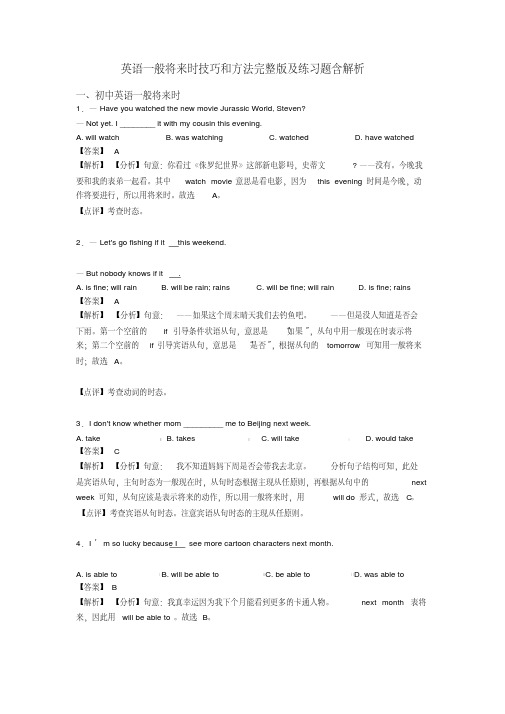
英语一般将来时技巧和方法完整版及练习题含解析一、初中英语一般将来时1.— Have you watched the new movie Jurassic World, Steven?— Not yet. I ________ it with my cousin this evening.A. will watchB. was watchingC. watchedD. have watched 【答案】 A【解析】【分析】句意:你看过《侏罗纪世界》这部新电影吗,史蒂文? ——没有。
今晚我要和我的表弟一起看。
其中watch movie意思是看电影,因为this evening 时间是今晚,动作将要进行,所以用将来时。
故选A。
【点评】考查时态。
2.— Let's go fishing if it this weekend.— But nobody knows if it .A. is fine; will rainB. will be rain; rainsC. will be fine; will rainD. is fine; rains 【答案】 A【解析】【分析】句意:——如果这个周末晴天我们去钓鱼吧。
——但是没人知道是否会下雨。
第一个空前的if引导条件状语从句,意思是“如果”,从句中用一般现在时表示将来;第二个空前的if引导宾语从句,意思是“是否”,根据从句的tomorrow可知用一般将来时;故选A。
【点评】考查动词的时态。
3.I don't know whether mom _________ me to Beijing next week.A. takeB. takesC. will takeD. would take 【答案】 C【解析】【分析】句意:我不知道妈妈下周是否会带我去北京。
分析句子结构可知,此处是宾语从句,主句时态为一般现在时,从句时态根据主现从任原则,再根据从句中的next week可知,从句应该是表示将来的动作,所以用一般将来时,用will do形式,故选C。
(完整word版)一般将来时态讲解及练习和答案

1、概述一般将来时表示将来某个时间要发生的动作或存在的状态,常与表示将来的时间状语连用,如tomorrow,next week,next year等。
Why don’t you put the meat in the fridge? It will stay fresh for several days.为什么不把肉放在冰箱里?它可以保鲜好几天。
—You’ve left the light on。
你忘了关灯了。
- Oh , so I have。
I'll go and turn it off。
噢,那我马上去关.2、构成一般将来时由“助动词will/shall+动词原形”构成。
will用于第二、三人称,shall第一人称。
在口语中,will在名词或代词后常缩写为’ll,will not简缩为won’t[wount]。
但在美国英语中,各种人称皆可用will。
He will help his sister with her lessons。
他将帮助他妹妹做功课.We won’t be free this afternoon.今天下午我们没空。
3、一般将来时的用法(1)表示未来的动作或存在状态,常与表示将来的时间状语连用,如tomorrow, next Sunday, soon,in a month, in the future等。
We shall leave for London next Monday.我们将在下周一去伦敦。
He will come to see you the day after tomorrow.后天他要来看你。
You will be 20 next year。
明年你就二十了。
(2)表示将来反复发生的动作或习惯性动作We shall come and work in this factory every year.我们将每年来这工厂参加劳动。
The students will have five English classes per week this term.本学期学生每周将要上五节英语课。
一般将来时归纳及专项练习题
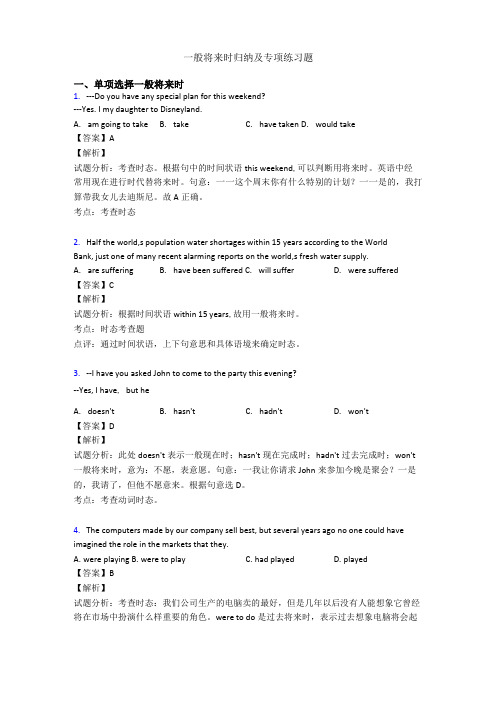
一般将来时归纳及专项练习题一、单项选择一般将来时1.---Do you have any special plan for this weekend?---Yes. I my daughter to Disneyland.A. am going to takeB. takeC. have takenD. would take【答案】A【解析】试题分析:考查时态。
根据句中的时间状语this weekend,可以判断用将来时。
英语中经常用现在进行时代替将来时。
句意:一一这个周末你有什么特别的计划?一一是的,我打算带我女儿去迪斯尼。
故A正确。
考点:考查时态2.Half the world,s population water shortages within 15 years according to the World Bank, just one of many recent alarming reports on the world,s fresh water supply.A. are sufferingB. have been sufferedC. will sufferD. were suffered【答案】C【解析】试题分析:根据时间状语within 15 years,故用一般将来时。
考点:时态考查题点评:通过时间状语,上下句意思和具体语境来确定时态。
3.--I have you asked John to come to the party this evening?--Yes, I have, but heA. doesn'tB. hasn'tC. hadn'tD. won't【答案】D【解析】试题分析:此处doesn't表示一般现在时;hasn't现在完成时;hadn't过去完成时;won't 一般将来时,意为:不愿,表意愿。
英语一般将来时解题技巧及练习题及解析

英语一般将来时解题技巧及练习题及解析一、初中英语一般将来时1.Mr. Smith our school next year.A. will visitB. visitsC. was visitingD. visited【答案】 A【解析】【分析】句意:史密斯先生下一年将参观我们的学校。
根据时间状语next year判断,时态为一般将来时态,故答案为A。
【点评】考查动词时态,本题涉及一般将来时的应用,表示在将来某个时间将要发生的动作或存在的状态。
2.— I hear your father has gone to Tokyo on business?— Yes. And he _______ in three weeks.A. has returnedB. will returnC. would returnD. returns【答案】 B【解析】【分析】句意:—我听说你父亲出差去日本了?—是的。
他将在三周后回来。
时间状语in three weeks与一般将来时连用,故选B。
3.I’m so lucky because I see more cartoon characters next month.A. is able toB. will be able toC. be able toD. was able to【答案】B【解析】【分析】句意:我真幸运因为我下个月能看到更多的卡通人物。
next month表将来,因此用will be able to。
故选B。
【点评】考查一般将来时。
4.Michael _________ in a school in Yunnan from February to June next year.A. teachB. taughtC. will teachD. was teaching【答案】C【解析】【分析】句意:Michael将会在明年2月到6月在云南的学校教学。
- 1、下载文档前请自行甄别文档内容的完整性,平台不提供额外的编辑、内容补充、找答案等附加服务。
- 2、"仅部分预览"的文档,不可在线预览部分如存在完整性等问题,可反馈申请退款(可完整预览的文档不适用该条件!)。
- 3、如文档侵犯您的权益,请联系客服反馈,我们会尽快为您处理(人工客服工作时间:9:00-18:30)。
一般将来时用法及练习题一般将来时(附练习题)一般将来时(The future indefinite tense)一般将来时主要有以下几种表现形式:由助动词shall或will加动词原形构成,shall 用于第一人称,will 用于第二、三人称。
除英国外的说英语的国家,在陈述句中,即使在第一人称一般也用will,在英国也有这种趋势。
在口语中,常用shall, will的缩写形式为’ll, 如:I’ll, you’ll等。
Shall not的缩写式为:shan’t, will not 的缩写式为:won’t.肯定句:I/We shall/will go.You/He/She/They Will go.否定句:I/We shall/will not go.You/He/She/They Will not go.疑问句:Shall I/we go?Will you/he/she/they go?什么叫做一般将来时(1)一般将来时表示将要发生的动作或情况。
例如:I will(shall) arrive tomorrow.我明天到。
Will you be free tonight? 你今晚有空吗?We won’t (shan’t) be busy this evening. 我们今晚不忙。
(2)在一般将来时的句子中,有时有表示将来时间的状语,有时没有时间状语,这时要从意思上判断是否指未来的动作或情况。
例如:Will she come? 她(会)来吗?We’ll only stay for two weeks. 我们只待两星期。
The meeting won’t last long. 会开不了多久。
C. is going to beD. will go to be( ) 2. Charlie ________ here next month.A. isn’tworking B. doesn’t workingC. isn’t going to workingD. won’t work( ) 3. He ________ very busy this week, he ________ free next week.A. will be;is B. is; isC. will be; willbe D. is; will be( ) 4. There ________ a dolphin show in the zoo tomorrow evening.was B. is going to haveC. willhave D. is going to be( ) 5. –________ you ________ free tomorrow?– No. I ________ free the day after tomorrow.A. Are; going to;will B. Are; going to be; willC. Are; going to; will beD. Are; going to be; will be( ) 6. Mother ________ me a nice present on my next birthday.A. willgives B. will givegives D. give( ) 7. –Shall I buy a cup of tea for you?–________. (不,不要。
)A. No, youwon’t. B. No, you aren’t.C. No, pleasedon’t. D. No, please.( ) 8. –Where is the morning paper?– I ________ it for you at once.A. getB. am gettingC. to getD. will get二、动词填空。
1. I ______(leave)in a minute. I ______(finish)all my work beforeI ______ (leave).2. —How long _____ you _____(study)in our country?—I _____(plan)to be here for about one more year.—I _____(hope)to visit the other parts of your country.—What ______ you ______(do)after you ______(leave)here?—I ______(return)home and ______(get)a job.3. I ______(be)tired. I ______(go)to bed early tonight.4. Mary’s birthday is next Monday, her mother _____(give)her a present.三、句型转换。
1. People in the north often go skating in winter. (next winter)2. There are two cinemas in that town. (next year)3. He comes back late.(in two days)4. She is a conductor of a train.(soon)参考答案:一、单项选择。
1. C2. D3. D4.D5. D6.B 7.C 8. D二、动词填空。
1. am leaving ; will finish ; leave2. will ; study ; plan ; hope ; will ; do ; leave ; will return ; get3. am ; will4. will give三、句型转换。
1. People in the north will go skating next winter.2. There will be two cinemas in that town next year.3. He will come back late in two days.4. She will be a conductor of a train soon.家庭作业一、单项选择。
( ) 1. The day after tomorrow they ________ a volleyball match.A. will watchingB. watchesC. is watchingD. is going to watch( ) 2. There ________ a birthday party this Sunday.A. shall beB. will beC. shall going to beD. will going to be( ) 3. They ________ an English evening next Sunday.A. are havingB. are going to haveC. will havingD. is going to have( ) 4. ________ you ________ free next Sunday?A. Will; areB. Will; beC. Do; beD. Are; be( ) 5. He ________ there at ten tomorrow morning.A. willB. isC. will beD. be( ) 6. ________ your brother ________ a magazine from the library?A. Are; going to borrowB. Is; going to borrowC. Will; borrowsD. Are; going to borrows二、动词填空。
1. I am afraid there ______(be)a meeting this afternoon. I can’t join you.2. Mike ______(believe, not)this until he ______(see)it with his own eyes.3. Most of us don’t think their team ______(win).三、句型转换。
1. China is a modern and strong country.(in twenty years)2. Do you study hard?(from now on)3. She didn’t speak E nglish at the meeting.(before long)The keys:一、单项选择。
1. D2. B3. B4. B5.C6. B二、动词填空。
1. will be2. won’t believe ; sees3. will win三、句型转换。
1. China will be a modern and strong country in twenty years.2. Will you study hard from now on?3. She won’t speak English at the meeting before long.。
